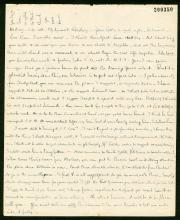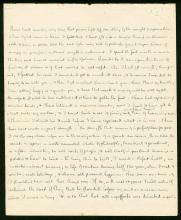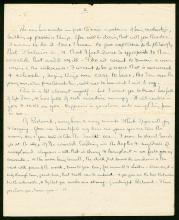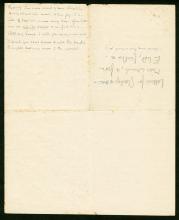BRACERS Record Detail for 19361
To access the original letter, email the Russell Archives.
"Wed evg." "Henceforth I will be less reckless: it is time to gather the fruit. I have had experience of various kinds, and I have believed in various creeds; now I feel I have got to what suits my nature, and I must think more of giving out what I have learnt than of learning more. Otherwise I shall be dead before I have expressed what is in me.... I see the way clear before me to the realization of a great ambition, the ambition to create and express a well-rounded whole of philosophy, theoretical and practical, in a form interesting to all sorts of people, and with really important bearings on politics and how to live."
There are three transcriptions of this letter:
Document .052451, record 99928. Document .201153, record 116384. These transcriptions are condensed with several sentences left out from the main body of the letter. The sentences written the next morning, Thursday, have not been transcribed either.
Extracts enclosed with cover letter from Malleson to Clifford Allen, 13 September 1918, Rec. Acq. 18, record 116382 (cover letter) and record 116383 (extracts).
Letter 103
BR TO CONSTANCE MALLESON, 11–12 SEPT. 1918
BRACERS 19361. ALS. McMaster. SLBR 2: #321
Previous Brixton letter, BRACERS 18692; next letter, BRACERS 19362
Edited by K. Blackwell, A. Bone, N. Griffin and S. Turcon
<Brixton Prison>1
Wed. evg. 11 Sp. 1918.
My dearest Darling
Your letter is such a joy,2 Beloved. Less than 3 weeks3 now. I shall breakfast here that day. And I shall ring your bell and you will open your door and we shall be together. And all this long weary time will shrink into a moment, and we shall begin the real life together. I do love your having this work and feeling like C.A. with the N.C.F.4 Yes, I can quite imagine that you and Gordon have to put all the driving force5 into it. But it is splendid having something one believes in to put one’s force into. — I gather indirectly from Gladys that you can manage the plans I suggested, as regards dates. I have suggested Oct. 22 to Ottoline, and she suggests Lulworth Cove — so I shall take that as settled.6 The intervening week-end I suppose I ought to spend with my brother. Probably I should be only 2 nights at Lulworth — then come back for 2 nights and then go to C.A. at Leith Hill7 for week-end. He is to be there 2 months at least, as you will have heard. I think he has escaped C.E.M.8 He was subdued before my brother but it was lovely seeing him. I do love him.
I must stick to leaving N.C.F. Comee.9 I can’t be just a perfunctory member; I know they will do things I shall disagree with, and I would rather resign without disagreement. If I stay on, I shall not be able to get absorbed in philosophy. If Salter writes to suggest reconsidering, I will write him a long letter.10— How amusing to think of old Voltaire so bacchanalian!11 When those things come from Marlow,12 you can put the Persian bowl13 on its ebony stand in the place where Voltaire is now.14 And there should also be 2 candlesticks from Marlow to go on the mantelpiece. I feel V. is not appropriate to you so much as the Persian bowl, which always was there for years until I got V. But of course you will have which you like best. I love to think of you there15 only I keep feeling apologetic and afraid you won’t like it or won’t be comfortable or something. Oh what heaven it will be to be there with you. You must tell me all the business of the new theatre and let me enter into it fully.
These last weeks, every day that passes lifts off something of the weight of separation. When I first came in here, I felt that I had got into a tangle through recklessness16 — risk of being in prison till the end of the war, risk of poverty, great expenditure of energy on pacifism without anything achieved. I spent the first month or more thinking out how to avoid unfruitfulness. Thanks to the amazing kindness of friends, it seems as if that would be all right. When I had got everything thought out, I fretted because I couldn’t get to work at once, and because I wanted so terribly to be with you — and then I got morbid fears about you. Now I have no troubles, I am utterly happy as regards you, and I see that work and money will be all right. Henceforth I will be less reckless: it is time to gather the fruit. I have had experience of various kinds, and I have believed in various creeds; now I feel I have got to what suits my nature, and I must think more of giving out what I have learnta than of learning more. Otherwise I shall be dead before I have expressed what is in me. I have these last weeks a great strength — the strength that comes of a perfectly clear purpose. I see the way clear before me to the realization of a great ambition, the ambition to create and express a well-rounded whole of philosophy, theoretical and practical, in a form interesting to all sorts of people, and with really important bearings on politics and how to live. To bring this to birth, I need: Perfect health; no anxieties about money; a life of routine during half the year, when I read and write; real holidays; and above all personal happiness. There seems no reason why I shouldn’t have all these things now. If so, in the next 10 years I will actually achieve the sort of thing that has floated before my mind as a vision ever since I was a boy.17 It is to that that all my efforts are directed now.
The war has made me feel the terrific importance of being constructive, building up positive things. You will be doing that with your theatre. I mean to do it too: I mean to give expression to the philosophy that I believe in, and that I feel sure is appropriate to the world that will exist. I do not want to remain a voice crying in the wilderness: I want to be a voice that is answered and echoed, saying things men care to hear. And I am sure the young men, when peace liberates them, will care to hear what I wish to say.
This is a lot about myself — but I want you to know how full of life I am, and how full of real creative energy. It all centres in you and rests on you. Happiness in your love sets everything free in me.
My Beloved, every hour and every minute I think of you with joy and longing. You are beautiful my dear one, your eyes are like the morning star and your soul is like the sunlit sea. I seem to stand beside you at the edge of the world18 looking into the depths and mysteries of unexplored abysses — all that is strong and triumphant in me feels you my comrade19 — and the wiser being beneath, the child, that knows its weakness and the vast cold power of the world, turns to you too, for warmth and shelter. Dear one, it is only through love, great love, that truth can be endured — and you give me the love that makes truth endurable, and by that you make me strong. Goodnight Beloved — I love you, love you, love you.
B.
You have been angelic to Eliot20 — thank you 1000 times.b
Thurs mg. One more word of love Darling. A very short time now — and then joy. I am full of happiness, more every day — Your letters are an infinite delight and comfort to me — All my heart is with you every moment — I send you 1000 kisses and all the tender thoughts that ever were in the world.
Letters for Gladys and Ottoline and Miss Wrinch, and from Eliot,21 further on. (Read any that interest you)c
- 1
[document] The letter was edited from the initialled, twice-folded, two-sheet original in the Malleson papers in the Russell Archives. The folding left exposed two originally blank quarter pages. The “Thurs mg.” note appears on one of them, and the note about other letters on the other. The letter was published as #321 in Vol. 2 of BR’s Selected Letters.
- 2
Your letter is such a joyColette’s letter of 7 September (BRACERS 113157).
- 3
Less than 3 weeks In fact it was three days, as BR was granted an earlier remission of his sentence by Sir George Cave, the Home Secretary. He left prison on 14 September, eighteen days earlier than his expected release date of 2 October.
- 4
having this work … feeling like C.A. with the N.C.F.Colette’s work with the Experimental Theatre and her dramatizing of Wuthering Heights for the screen are meant. The comparison with Allen suggests that both found work that satisfied their creative impulses.
- 5
you and Gordon … the driving force Captain Stephen Gordon, a north-country lawyer working for the government in London, was to be the honorary treasurer of the Experimental Theatre, with Colette noting that he had “put most of the drive into <the> whole thing” (3 Aug. 1918; BRACERS 113147). More than a month later, BR echoed this phrase. Her most recent letter (7 Sept. 1918, BRACERS 113157), indicated only the amount that the Experimental Theatre had collected — £1,000, with her and Miles to collect another £100 the following day.
- 6
Oct. 22 to Ottoline … Lulworth Cove … as settledOttoline and BR intended to stay for about a week at this picturesque Dorset location. While still in prison, BR keenly anticipated visiting the coast (see Letter 94) and told Ottoline after his release that he was “counting on Lulworth” (3 Oct. 1918, BRACERS 18698). Despite BR’s assumption that the arrangements were settled, Ottoline dropped out of the planned trip on 7 October (BRACERS 114761), and BR ended up going to Lulworth with Colette, on 16–19 October.
- 7
then go to C.A. at Leith Hill BR did spend time at the end of October 1918 with Clifford Allen at Lemons Cottage, Abinger, which is near Leith Hill.
- 8
C.E.M.Catherine Marshall and Clifford Allen travelled together in the north of England and in Scotland during his convalescence, upon his release from prison in December 1917. Despite their undoubted romance, Martin Gilbert’s Plough My Own Furrow: the Story of Lord Allen of Hurtwood as Told through His Writings and Correspondence (London: Longmans, 1965) does not suggest one; nor does Jo Vellacott, Bertrand Russell and the Pacifists in the First World War (New York: St. Martin’s P., 1980), while noting their travels together (p. 218).
- 9
I must stick to leaving N.C.F. Comee.Colette had written: “But I find I’m still a bit sad about your leaving the N.C.F. Couldn’t you manage National Committee once a month?” (7 Sept. 1918; BRACERS 113157). BR’s letter of resignation was to be given by Gladys Rinder (6 Sept., BRACERS 79633) to Dr. Salter for the meeting of the National Committee on 13 September, the day before his sudden, unexpected release from Brixton. BR had attempted to resign less formally, but Rinder begged him for a proper note or message (3 Sept., BRACERS 79631); no copy is known. The resignation was not announced in The Tribunal.
- 10
write him a long letterColette had advised writing a “good long letter” of resignation if he was set on leaving the No-Conscription Fellowship (7 Sept. 1918; BRACERS 113157).
- 11
old Voltaire so bacchanalianColette was arranging BR’s things at Russell Chambers. She had put his bust of Voltaire on the mantelpiece and told BR: “Voltaire is looking wildly bacchanalian on his perch above the fire. I’ve put clusters of glowing rowan berries behind his witty old head. He doesn’t mind at all. He’s quite enjoying himself in honour of your return” (7 Sept. 1918; BRACERS 113157).
- 12
Marlow T.S. Eliot and his wife, Vivienne, rented a cottage at 31 West Street in the village of Marlow, Bucks., on 5 December 1917, taking a five-year lease (The Letters of T.S. Eliot, ed. Valerie Eliot et al. [London: Faber and Faber, 1988], 1: 233). BR had a financial obligation with regard to the rental and contributed furniture as well. He asked in Letter 56 whether Eliot had brought the things that he had sent for. He did not get them until 1919 (Eliot, Letters, 1: 337). In 1919, tenants were subletting Marlow from the Eliots; their lease ended on 25 March (BR to Colette, 5 Feb. 1919, BRACERS 19430). On 19 March 1919 BR wrote to Eliot (BRACERS 57864), enclosing a list of things at Marlow that he needed returned. They included a tea-table and coffee-grinder, as well as clothing. A month later Vivienne Eliot said she had been to Marlow to pick up the table but she could not get help in bringing it back (19 April 1919, BRACERS 1025). There is no indication of either the Eliots or BR being at Marlow after 1920; it seems to have been sublet again, unfurnished.
- 13
Persian bowl “Would you also perhaps say that your Persian bowl had been (and is) your most important objet d’art?” Colette posed this question in her letter of 2 January 1950, p. 15 (BRACERS 98449).
- 14
where Voltaire is now In her reply Colette jested that she “had a long confab with Voltaire, who isn’t at all enchanted at your proposal to remove him from his perch. So you and he can fight it out between you. Scrumptious prospect” (13 Sept. 1918; BRACERS 113160).
- 15
you thereColette moved into BR’s Bury Street flat on 9 September 1918 (BRACERS 113157).
- 16
tangle through recklessness BR may have meant in particular his sentence in “The German Peace Offer” (The Tribunal, no. 90 [3 Jan. 1918]: 1; Auto. 2: 79–81; 92 in Papers 14): “The American Garrison which will by that time by occupying England and France, whether or not they prove efficient against the Germans, will no doubt be capable of intimidating strikers, an occupation to which the American Army is accustomed when at home.” The Government prosecuted him specifically for this sentence. BR had, in fact, drawn back from his anti-war work and had written the article only because the editor was ill (Auto. 2: 33).
- 17
ambition to create … a well-rounded whole of philosophy … a vision ever since I was a boy BR reiterated this ambition in his Autobiography: “As soon as I realized that I was intelligent, I determined to achieve something of intellectual importance if it should be at all possible, and throughout my youth I let nothing whatever stand in the way of this ambition” (Auto. 1: 36–7). As an old man, BR recalled visiting the Tiergarten in Berlin in 1895, when he “determined to write two series of books: one abstract, growing gradually more concrete; the other concrete, growing gradually more abstract. They were to be crowned by a synthesis, combining pure theory with a practical social philosophy. Except for the final synthesis, which still eludes me, I have written these books” (Auto. 3: 222).
- 18
stand beside you at the edge of the world He wrote similarly to Colette in Letter 81 (see note 14 there) and on 8 June 1919 (BRACERS 19487).
- 19
my comrade His usual phrase was “heart’s comrade”.
- 20
angelic to Eliot In Letter 81 BR asked Colette if she had been “able to accomplish anything for Eliot”, who faced being called up for military service by the United States. Colette did introduce T.S. Eliot to an American army officer, Colonel J. Mitchell, but it is unclear what, if anything, resulted from their meeting at Russell Chambers on the same day as BR wrote Letter 103. Ultimately, Eliot served briefly in the American navy after being called up in the final weeks of the war. After his release BR expressed jealousy of Mitchell in varying degrees in letters until the last mention of him on 8 June 1919 (BRACERS 19487; SLBR 2: #327).
- 21
Letters for Gladys and Ottoline and Miss Wrinch, and from Eliot Only the letter to Ottoline is known to be extant (Letter 102).




